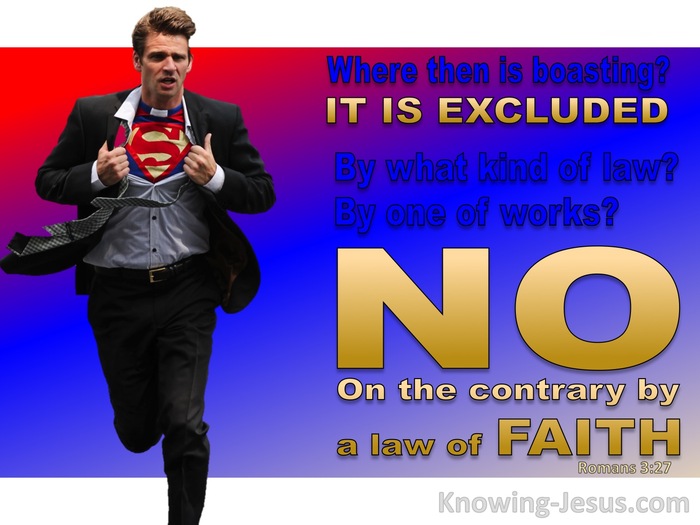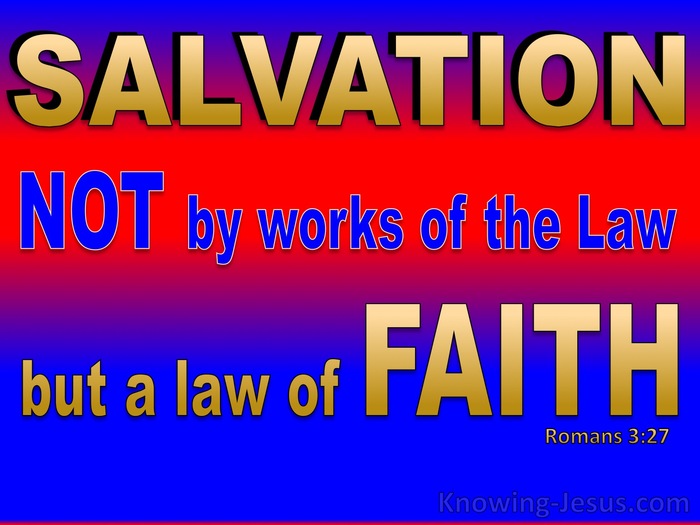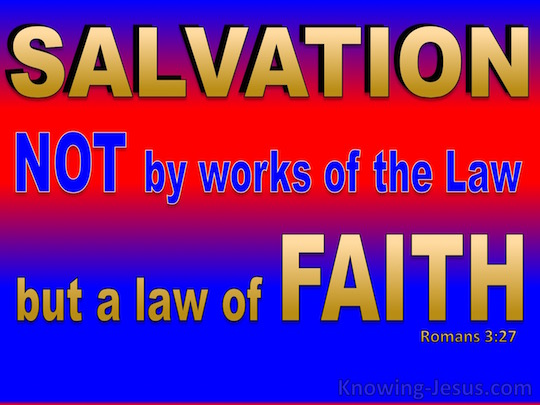Parallel Verses
New American Standard Bible
Where then is
King James Version
Where is boasting then? It is excluded. By what law? of works? Nay: but by the law of faith.
Holman Bible
Where then is boasting?
International Standard Version
What, then, is there to boast about? That has been eliminated. On what principle? On that of actions? No, but on the principle of faith.
A Conservative Version
Where then is the boasting? It is excluded. By what law, of works? No, but by a law of faith.
American Standard Version
Where then is the glorying? It is excluded. By what manner of law? of works? Nay: but by a law of faith.
Amplified
Then what becomes of [our] boasting? It is excluded [entirely ruled out, banished]. On what principle? On [the principle of good] works? No, but on the principle of faith.
An Understandable Version
Where then is the [basis for] boasting [i.e., over being right with God]? There is not any. Is it by [obedience to] a law? Is it by doing certain deeds? Not at all, but by a law of faith.
Anderson New Testament
Where, then, is boasting? It is excluded. By what law? Of works? No; but by the law of faith.
Bible in Basic English
What reason, then, is there for pride? It is shut out. By what sort of law? of works? No, but by a law of faith.
Common New Testament
Where then is our boasting? It is excluded. On what law? On the law of works? No, but on the law of faith.
Daniel Mace New Testament
what reason then is there for boasting? it is excluded. what, by the ceremonial law? no: but by the law of faith.
Darby Translation
Where then is boasting? It has been excluded. By what law? of works? Nay, but by law of faith;
Godbey New Testament
Then where is boasting? It is excluded. By what law? of works? No; but by the law of faith.
Goodspeed New Testament
Then what becomes of our boasting? It is shut out. On what principle? What a man does? No, but whether a man has faith.
John Wesley New Testament
Where is boasting then? It is excluded. By what law? Of works?
Julia Smith Translation
Where then boasting? It was excluded. By what law? of works? No: but by the law of faith.
King James 2000
Where is boasting then? It is excluded. By what law? of works? Nay: but by the law of faith.
Lexham Expanded Bible
Therefore, where [is] boasting? It has been excluded. By what kind of law? Of works? No, but by a law of faith.
Modern King James verseion
Then where is the boasting? It is excluded. Through what law? Of works? No, but through the law of faith.
Modern Spelling Tyndale-Coverdale
Where is then thy rejoicing? It is excluded. By what law? By the law of works? Nay: but by the law of faith.
Moffatt New Testament
Then what becomes of our boasting? It is ruled out absolutely. On what principle? On the principle of doing deeds? No, on the principle of faith.
Montgomery New Testament
Then what becomes of boasting? It is shut out. What sort of law forbids it? A law of works? No, but a law of faith.
NET Bible
Where, then, is boasting? It is excluded! By what principle? Of works? No, but by the principle of faith!
New Heart English Bible
Where then is the boasting? It is excluded. By what manner of law? Of works? No, but by a law of faith.
Noyes New Testament
Where then is the boasting? It is excluded. By what law? of works? Nay; but by the law of faith.
Sawyer New Testament
Where then is the boasting [of the Jew]? It is excluded. By what law? Of works? No; but by the law of faith.
The Emphasized Bible
Where, then, the boasting! It is excluded. Through what kind of law? Of works? Nay! but through a law of faith:
Thomas Haweis New Testament
Where then is boasting? It is excluded. By what law? of works? No: but by the law of faith.
Twentieth Century New Testament
What, then, becomes of our boasting? It is excluded. By what sort of Law? A Law requiring obedience? No, a Law requiring faith.
Webster
Where is boasting then? It is excluded. By what law? of works? No; but by the law of faith.
Weymouth New Testament
Where then is there room for your boasting? It is for ever shut out. On what principle? On the ground of merit? No, but on the ground of faith.
Williams New Testament
So where has human boasting gone? It was completely shut out. On what principle? On that of doing something? No, but on the principle of faith.
World English Bible
Where then is the boasting? It is excluded. By what kind of law? Of works? No, but by a law of faith.
Worrell New Testament
Where, then, is the boasting? It was excluded. By what manner of law? Of works? Nay; but by a law of faith.
Worsley New Testament
Where then is boasting? it is excluded: by what law? of works? no: but by the law of faith.
Youngs Literal Translation
Where then is the boasting? it was excluded; by what law? of works? no, but by a law of faith:
Themes
Interlinear
Dia
Dia
References
Word Count of 37 Translations in Romans 3:27
Prayers for Romans 3:27
Verse Info
Context Readings
Boasting Excluded
26
manifesting in this time his righteousness that he only be the just one and the justifier of him that is of the faith of Jesus.
27 Where then is
Cross References
Romans 2:23
Thou that makest thy boast of the law, with rebellion to the law doth thou dishonour God?
Romans 4:2
For if Abraham were justified by works, he has reason to glory in himself, but not before God.
1 Corinthians 1:29-31
that no flesh should glory in his presence.
Romans 2:17
Behold, thou doth call thyself a Jew and art supported by the law and doth glory in God
Ezekiel 16:62-63
And I will confirm my covenant with thee; and thou shalt know that I am the LORD:
Ezekiel 36:31-32
Then ye shall remember your own evil ways and your doings that were not good and shall loathe yourselves in your own sight for your iniquities and for your abominations.
Zephaniah 3:11
In that day thou shalt not be ashamed for any of thy doings, in which thou hast rebelled against me, for then I will take away out of the midst of thee those that rejoice in thy pride, and thou shalt no longer be haughty because of the mountain of my holiness.
Mark 16:16
He that believes and is baptized shall be saved, but he that believes not shall be condemned.
Luke 18:9-14
And he spoke this parable unto some who trusted in themselves that they were righteous and despised others:
John 3:36
He that believes in the Son has eternal life, and he that does not obey the Son shall not see life, but the wrath of God abides on him.
Romans 3:19
Now we know that all that the law says, it says to those who are under the law, that every mouth may be stopped, and all the world may submit themselves unto God.
Romans 7:21
So that, desiring to do good, I find this law: evil is natural unto me.
Romans 7:23
but I see another law in my members which rebels against the law of my mind, bringing captive unto the law of sin which is in my members.
Romans 7:25
The grace of God, by Jesus, the Christ, our Lord. So then with the mind I myself serve the law of God, but with the flesh the law of sin.
Romans 8:2
For the law of the Spirit of life in Christ, Jesus, has made me free from the law of sin and death.
Romans 9:11
(for the children being not yet born, neither having done any good or evil, that the purpose of God according to election might stand: not of works, but of him that calls),
Romans 9:32
Why? Because they followed it not by faith but, as it were, by the works (of the law); therefore, they stumbled on the stumblingstone;
Romans 10:5
For Moses describes the righteousness which is by the law, That the man who does those things shall live by them.
Romans 11:6
And if by grace, then is it not by works; otherwise, the grace is no longer grace. But if it is of works, then it is no longer grace; otherwise, the work is no longer work.
1 Corinthians 4:7
For who makes thee to judge? and what hast thou that thou didst not receive? now if thou didst receive it, what dost thou glory of, as if thou hadst not received it?
Galatians 2:16
knowing that a man is not justified by the works of the law, but by the faith of Jesus Christ, even we have believed in Jesus Christ, that we might be justified by the faith of Christ, and not by the works of the law; for by the works of the law shall no flesh be justified.
Galatians 3:22
But the scripture has concluded all under sin that the promise by faith of Jesus Christ might be given to the believers.
Ephesians 2:8-10
For by grace are ye saved through faith and that not of yourselves: it is the gift of God,
1 John 5:11-12
And this is the witness, that God has given eternal life to us, and this life is in his Son.






